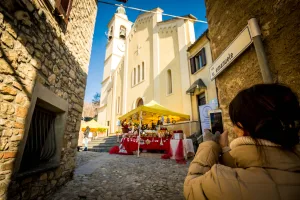The picturesque medieval town of Varzi is home to a culinary treasure that has been known and loved for generations: almond cake. This local delicacy is an authentic speciality that enchants the palate with its unique texture and unmistakable almond flavour.
Origins and history
Varzi almond cake has a rich and fascinating history, lost in local tradition. Its origins go back centuries, when almond cultivation was widespread in the area due to its sunny location. With their delicate flavour and soft texture, almonds became a popular ingredient in the local cuisine. The idea was born to create a special cake that would bring out the flavour and aroma of these delicacies. The original recipe has been handed down from generation to generation, preserving its authenticity. It has been awarded the De.Co mark, the denomination of urban origin that certifies its paternity.
Ingredients and preparation
The cake is characterised by its simple but high-quality ingredients. The cake base consists of a generous amount of finely chopped almonds mixed with sugar, lemon zest, eggs and flour to form a soft, fragrant dough. The preparation phase requires care and attention. Once the ingredients have been mixed, the dough is poured into a baking tin and baked slowly in the oven until it is evenly golden. The result is a cake with a slightly crispy crust.
Special features
What makes Varzi almond cake so special are its distinctive characteristics. Firstly, the intense flavour of the almonds is the undisputed star. The finely chopped almonds give the cake a hint of sweetness and an enveloping aroma. A rich, fragrant flavour that gives the palate an unforgettable taste experience.
Tradition and culture
The Varzi almond cake is deeply rooted in local tradition and culture. Beloved by both the local community and tourists, it is often bought as a gastronomic souvenir to take a piece of Varzi home with you.
The merchants' cake
The women of Varzi used to make almond cake for the merchants who travelled along the Via del Sale to Genoa. The Salt Road was one of the most important trade routes linking the inland regions of Lombardy and Piedmont with the port of Genoa on the Ligurian Sea. This route was used to transport the precious salt, essential for the preservation of food.
The cake, thanks to its composition and the presence of almonds, was particularly suitable for long journeys. In fact, it kept its freshness and flavour for a long time without deteriorating, making it an excellent choice as a travel food. The cake was also a source of energy and nutrients needed to cope with the long and arduous journeys along the trade route.
The tradition of the women of Varzi making almond cake for the merchants on the salt route is a fascinating example of how cuisine adapted to the needs and traditions of local communities.
Not only did the cake provide tasty, long-lasting nourishment during the journey, but it also represented a gesture of generosity and hospitality on the part of the women of Varzi towards the traders passing through their town.













